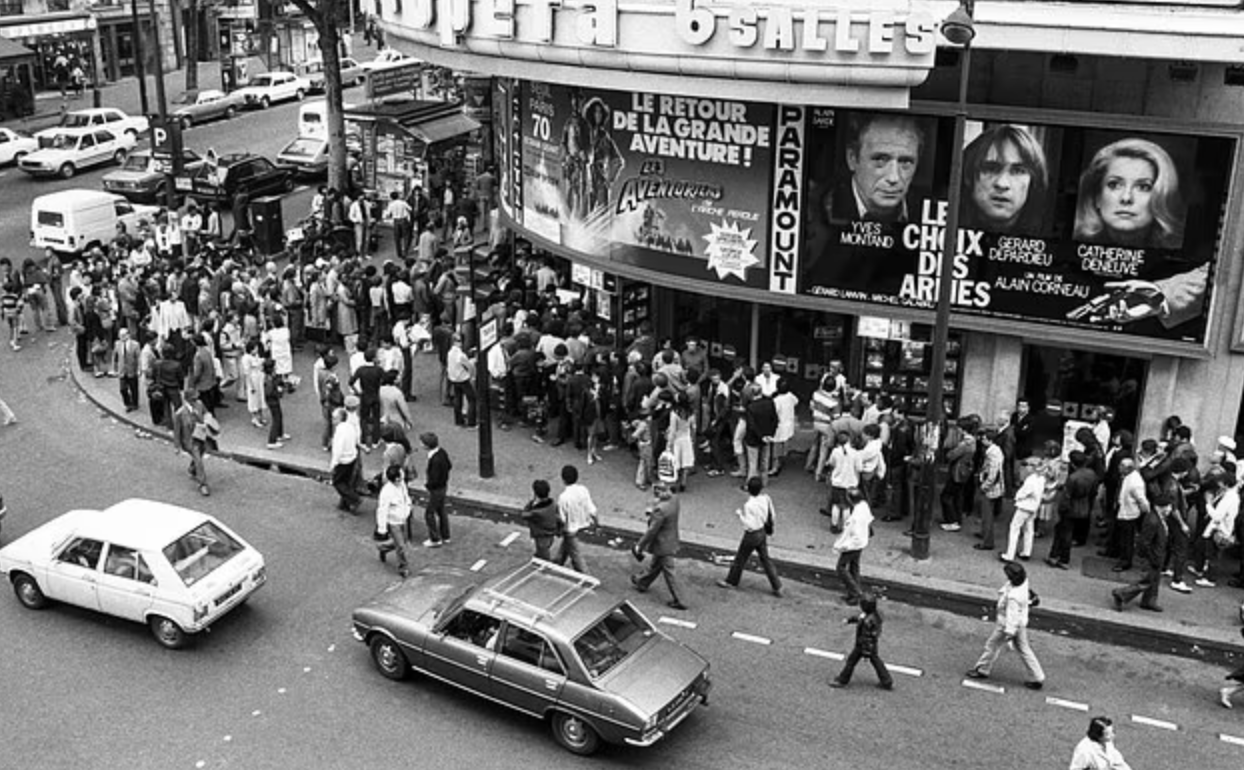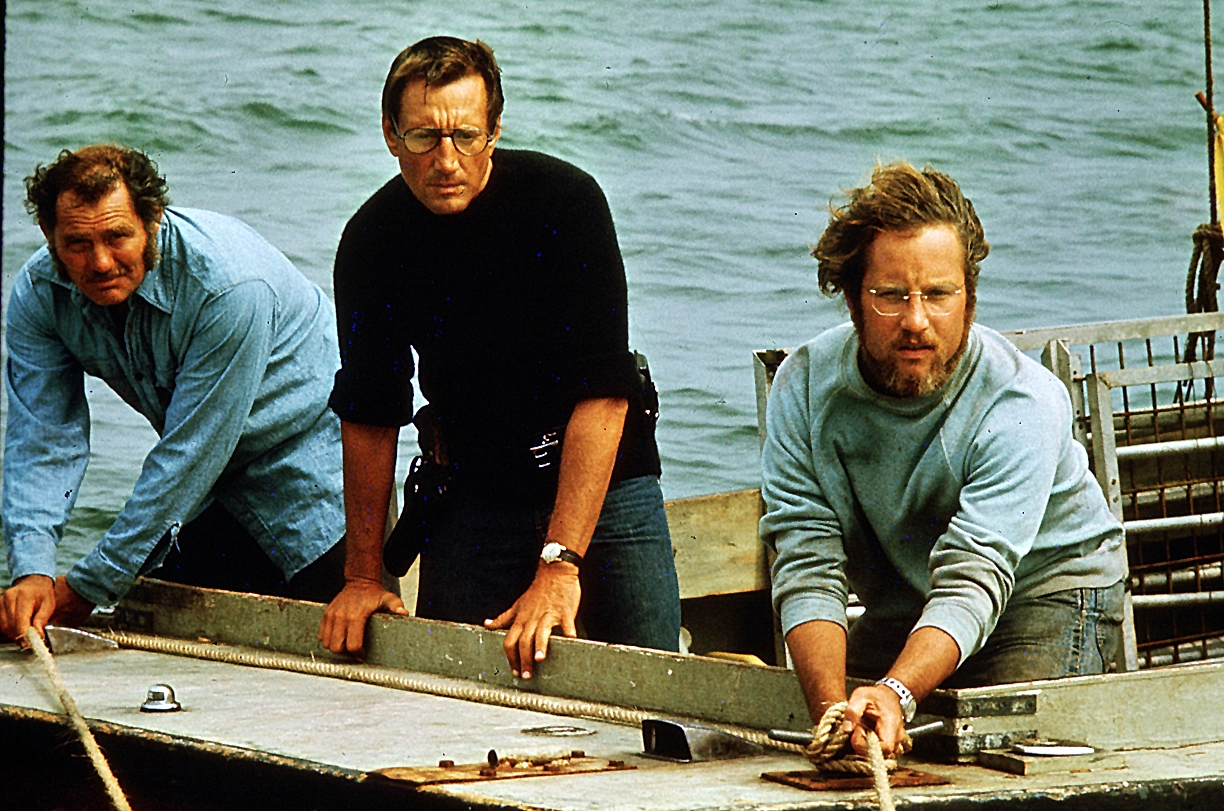Blockbuster: Where did the term come from, and why do we use it to describe movies?
- Replies 6
There are several movies that are the epitome of the term 'blockbuster', such as Jurassic Park, Star Wars, and Titanic, to name a few.
It is common knowledge that the term 'blockbuster' is applied to a movie in reference to its phenomenal box office performance; however, surprisingly few people are familiar with the origin of the term.
What does it have to do with movies, anyway?

In photos from the 1970s and 1980s, you can see many people waiting in line to see new movies as soon as they came out. Credit: Getty Images/Gamma-Rapho.
There are a lot of theories and speculations about the origin of the word 'blockbuster' that you may come across on the internet.
One of those theories is from Alice James, a 30-year-old publicist from Melbourne, who recently revealed the background of the word in one of her most recent videos on TikTok.
'Are you ready to have your mind absolutely blown? I learnt what the term "blockbuster" meant the other day, and I haven't stopped thinking about it,' she said.
According to Alice, back in the good old days, a movie was only considered a huge success if the line of people waiting to get tickets stretched out onto the street and around the block. This is where the terms 'block' and 'buster' came from.
More than 182,000 users on the platform watched her video, and many of them admitted they had 'no idea' what the word originally meant.
'I didn't know this either, and I'm 59,' one person wrote in the comments section, while another added: 'And people say TikTok doesn't teach you stuff, that's amazing news!'
Aside from Alice's theory, many people have also speculated that the term 'blockbuster' has wartime roots, particularly from World War II.
The word 'blockbuster' first appeared in TIME on November 29, 1942, in an article about how the Allies bombed important industrial targets in Italy. The bombs used for these missions were called 'blockbusters' because they could destroy an entire city block.
As the term kept showing up in news stories about Allied bombings, it became a metaphor for something shocking, explosive, or strikingly dramatic.
In the 1970s, 'blockbuster' was one of many words that could be used to describe a movie that did well at the box office. Other words included 'spectacular' and 'super-grosser'.
However, it wasn't until the release of Jaws that the concept of a true blockbuster movie came into existence.

Jaws is said to have forever changed modern cinema. Credit: Indiewire.
Jaws was a huge hit at the box office and with critics, and its sudden and dramatic rise to the top was all the more remarkable given that it happened with the end of a major Hollywood slump.
Since then, the whole film industry has been profoundly influenced by it, and later films would try to match its impact.
But these days, there isn't a defined threshold for how much money a movie must earn to qualify as a blockbuster.
Nowadays, in fact, the term has lost quite a bit of its meaning. Any film that is successful at the box office, regardless of whether or not its subject matter is particularly 'explosive', is called a 'blockbuster'.
Members, what do you think? Is it new information to you or did you already know this?
We also need to ask you: In your opinion, what movies have stood the test of time to become iconic examples of a 'blockbuster'?
We could use some movie night suggestions, so please share them in the comments!
It is common knowledge that the term 'blockbuster' is applied to a movie in reference to its phenomenal box office performance; however, surprisingly few people are familiar with the origin of the term.
What does it have to do with movies, anyway?
In photos from the 1970s and 1980s, you can see many people waiting in line to see new movies as soon as they came out. Credit: Getty Images/Gamma-Rapho.
There are a lot of theories and speculations about the origin of the word 'blockbuster' that you may come across on the internet.
One of those theories is from Alice James, a 30-year-old publicist from Melbourne, who recently revealed the background of the word in one of her most recent videos on TikTok.
'Are you ready to have your mind absolutely blown? I learnt what the term "blockbuster" meant the other day, and I haven't stopped thinking about it,' she said.
According to Alice, back in the good old days, a movie was only considered a huge success if the line of people waiting to get tickets stretched out onto the street and around the block. This is where the terms 'block' and 'buster' came from.
More than 182,000 users on the platform watched her video, and many of them admitted they had 'no idea' what the word originally meant.
'I didn't know this either, and I'm 59,' one person wrote in the comments section, while another added: 'And people say TikTok doesn't teach you stuff, that's amazing news!'
Aside from Alice's theory, many people have also speculated that the term 'blockbuster' has wartime roots, particularly from World War II.
The word 'blockbuster' first appeared in TIME on November 29, 1942, in an article about how the Allies bombed important industrial targets in Italy. The bombs used for these missions were called 'blockbusters' because they could destroy an entire city block.
As the term kept showing up in news stories about Allied bombings, it became a metaphor for something shocking, explosive, or strikingly dramatic.
In the 1970s, 'blockbuster' was one of many words that could be used to describe a movie that did well at the box office. Other words included 'spectacular' and 'super-grosser'.
However, it wasn't until the release of Jaws that the concept of a true blockbuster movie came into existence.
Jaws is said to have forever changed modern cinema. Credit: Indiewire.
Jaws was a huge hit at the box office and with critics, and its sudden and dramatic rise to the top was all the more remarkable given that it happened with the end of a major Hollywood slump.
Since then, the whole film industry has been profoundly influenced by it, and later films would try to match its impact.
But these days, there isn't a defined threshold for how much money a movie must earn to qualify as a blockbuster.
Nowadays, in fact, the term has lost quite a bit of its meaning. Any film that is successful at the box office, regardless of whether or not its subject matter is particularly 'explosive', is called a 'blockbuster'.
Members, what do you think? Is it new information to you or did you already know this?
We also need to ask you: In your opinion, what movies have stood the test of time to become iconic examples of a 'blockbuster'?
We could use some movie night suggestions, so please share them in the comments!







